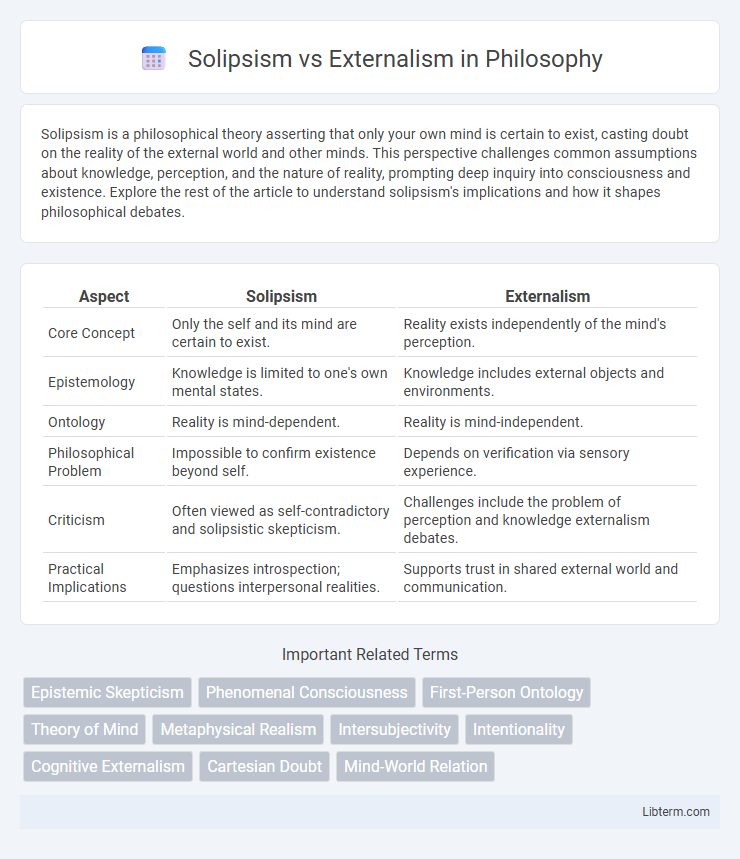Solipsism is a philosophical theory asserting that only your own mind is certain to exist, casting doubt on the reality of the external world and other minds. This perspective challenges common assumptions about knowledge, perception, and the nature of reality, prompting deep inquiry into consciousness and existence. Explore the rest of the article to understand solipsism's implications and how it shapes philosophical debates.
Table of Comparison
| Aspect | Solipsism | Externalism |
|---|---|---|
| Core Concept | Only the self and its mind are certain to exist. | Reality exists independently of the mind's perception. |
| Epistemology | Knowledge is limited to one's own mental states. | Knowledge includes external objects and environments. |
| Ontology | Reality is mind-dependent. | Reality is mind-independent. |
| Philosophical Problem | Impossible to confirm existence beyond self. | Depends on verification via sensory experience. |
| Criticism | Often viewed as self-contradictory and solipsistic skepticism. | Challenges include the problem of perception and knowledge externalism debates. |
| Practical Implications | Emphasizes introspection; questions interpersonal realities. | Supports trust in shared external world and communication. |
Introduction to Solipsism and Externalism
Solipsism posits that only one's own mind is certain to exist, questioning the reality of an external world and other minds, emphasizing subjective experience as the sole foundation of knowledge. Externalism, in contrast, asserts that the content of one's thoughts and knowledge depends on factors external to the mind, such as the environment and social context, highlighting objective reality's role in mental states. These opposing viewpoints frame fundamental debates in epistemology about the source and scope of human knowledge.
Defining Solipsism: The Self as Reality
Solipsism asserts that the self is the only certain reality, positing that all external entities and experiences exist solely within the mind of the individual. This philosophical stance challenges the existence of an independent external world, emphasizing subjective consciousness as the foundation of reality. By defining reality through personal perception, solipsism contrasts sharply with externalism, which upholds the existence of an objective world beyond individual experience.
Externalism Explained: Embracing the Outside World
Externalism emphasizes the idea that the contents of the mind are fundamentally shaped by the external environment and social context, rather than existing solely within the individual's internal consciousness. This philosophical perspective asserts that understanding meaning, knowledge, and mental states requires considering the interaction between the mind and the surrounding world. By embracing externalism, one acknowledges that cognition and perception are deeply embedded in and influenced by real-world factors beyond the self.
Historical Foundations of Solipsism
Solipsism, rooted in the philosophical inquiries of Rene Descartes and George Berkeley, emphasizes the primacy of self-consciousness in epistemology, asserting that only one's own mind is certain to exist. Historical foundations trace back to Descartes' methodological skepticism and Berkeley's idealism, which challenge the independent existence of the external world. This contrasts with externalism, which focuses on factors outside the individual's mind, grounding knowledge in external reality and environmental interaction.
Key Philosophers and Theories Behind Externalism
Externalism in philosophy of mind is notably advanced by Hilary Putnam and Tyler Burge, emphasizing that mental content depends on factors external to the individual. Putnam's Twin Earth thought experiment illustrates that meanings and mental states are influenced by the environment, challenging solipsism's inward focus. Burge further develops this by arguing that social and environmental contexts crucially shape cognitive processes, positioning externalism against solipsism's premise that only one's own mind is certain.
Main Arguments for Solipsism
Solipsism argues that only one's own mind is certain to exist, questioning the independent reality of the external world and other minds. Key arguments include the epistemic limitation that all knowledge is filtered through personal consciousness, creating a fundamental barrier to verifying external entities. This position emphasizes that experiences and perceptions cannot definitively prove anything beyond the individual's mental states.
Core Criticisms of Externalism
Externalism in epistemology, which holds that knowledge depends on factors outside an individual's mental states, faces core criticisms regarding its explanatory power and subjectivity. Critics argue externalism struggles to account for the subject's justification without access to external conditions, leading to epistemic luck and undermining internal cognitive control. This debate often contrasts with solipsism's emphasis on self-contained mental states as the sole basis of knowledge.
Epistemological Implications: Knowledge and Belief
Solipsism challenges the existence of any knowledge beyond one's own mind, asserting that beliefs about an external world cannot be justified without direct internal experience. Externalism, in epistemology, contends that knowledge depends on factors outside the subject's immediate mental states, such as the reliability of cognitive processes or environmental conditions. This contrast impacts the criteria for justified belief, where solipsism emphasizes introspective certainty and externalism allows for external verification as a basis for knowledge.
Solipsism vs Externalism in Modern Philosophy
Solipsism in modern philosophy asserts that only one's mind is certain to exist, emphasizing subjective experience as the sole reference for reality. Externalism counters this by arguing that mental states are not confined to internal consciousness but are influenced by external environmental factors, making reality objectively accessible. This debate shapes contemporary discussions on knowledge, perception, and the nature of existence within epistemology and philosophy of mind.
Practical Consequences and Ongoing Debates
Solipsism challenges the existence of an external world beyond one's own mind, leading to practical issues in communication, trust, and collaborative knowledge-building, whereas Externalism asserts the reality of an independent external world, facilitating shared understanding and empirical inquiry. Ongoing debates center on the epistemological justifications for belief in an external reality and the implications for cognitive science, artificial intelligence, and theories of mind. These discussions influence practical fields such as virtual reality development and psychological therapy, where assumptions about externalism or solipsism affect outcomes and methodologies.
Solipsism Infographic

 libterm.com
libterm.com